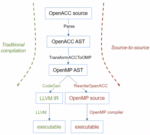New York – March 28, 2024 – Lightning AI today announced the availability of Thunder, a source-to-source compiler for PyTorch designed for training and serving the latest generative AI models across multiple GPUs. Thunder is the culmination of two years of research on the next generation of deep learning compilers, built with support from NVIDIA. […]
Search Results for: mpi
Quantum Brilliance Announces Software for Compiling Programs Written in CUDA Quantum
CANBERRA, AUSTRALIA, March 21, 2023 — Quantum Brilliance, a developer of quantum computing products and solutions, has released a new version of its open-source Qristal software able to compile quantum programs written in CUDA Quantum, NVIDIA’s newly announced open-source programming model. Announced today at NVIDIA GTC, a global AI conference, Quantum Brilliance’s new release of Qristal […]
ECP Pushes Cross-Platform Tested Compilers for HPC and Exascale Architectures
The Exascale Computing Project (ECP) is working to combine two key technologies, LLVM and continuous integration (CI), to ensure that current and future compilers are stable and performant on high-performance computing (HPC) and exascale computer systems. The proliferation of new machine architectures has made the continuous testing and verification of software (hence the “continuous” in CI) an essential part of US Department of Energy DOE supercomputing. Valentin Clement, a software engineer at Oak Ridge National Laboratory who is part of the team working to include LLVM in the ECP CI testing and verification framework, notes, “We are working to add CI for ECP-relevant architectures. This facilitates….
Compiler Pioneers Aho, Ullman Win ACM’s Turing Award
Sometimes referred to as the “Nobel Prize of computing,” the A.M. Turing Award this year will go to Alfred Vaino Aho and Jeffrey David Ullman, the Association for Computing Machinery (ACM) announced today. Aho is the Lawrence Gussman Professor Emeritus of Computer Science at Columbia University, and Ullman is the Stanford W. Ascherman Professor Emeritus of Computer […]
Clacc – Open Source OpenACC Compiler and Source Code Translation Project
By Rob Farber, contributing writer for the Exascale Computing Project Clacc is a Software Technology development effort funded by the US Exascale Computing Project (ECP) PROTEAS-TUNE project to develop production OpenACC compiler support for Clang and the LLVM Compiler Infrastructure Project (LLVM). The Clacc project page notes, “OpenACC support in Clang and LLVM will facilitate the programming of GPUs and other accelerators in DOE applications, […]
NERSC, ALCF, Codeplay Partner on SYCL GPU Compiler
The National Energy Research Scientific Computing Center (NERSC) at Lawrence Berkeley National Laboratory (LBNL) and Argonne Leadership Computing Facility (ALCF) are working with Codeplay Software to enhance the LLVM SYCL GPU compiler capabilities for Nvidia A100 GPUs. The collaboration is designed to help NERSC and ALCF users, along with the HPC community in general, produce […]
Spotting HPC and Exascale Bottlenecks with TAU CPU/GPU/MPI Profiler
Programmers cannot blindly guess which sections of their code might bottleneck performance. This problem is worsened when codes run across the variety of hardware platforms supported by the Exascale Computing Project (ECP). A section of code that runs well on one system might be a bottleneck on another system. Differing hardware execution models further compound the performance challenges that face application developers; these models can include the somewhat restricted SIMD (Single Instruction Multiple Data) and SIMT (Single Instruction Multiple Thread) computing for GPU models and the more complex and general MIMD (Multiple Instruction Multiple Data) for CPUs. New software programming models, such as Kokkos, also introduce multiple layers of abstraction and lambda functions that can hide or obscure the low-level execution details due to their complexity and anonymous nature. Differing memory systems inside a node and differences in the communications fabric that connect high-performance computing (HPC) nodes in a distributed supercomputer environment add even greater challenges in identifying performance bottlenecks during application performance analysis.
DataOps Champions, Online
Here’s why you can’t afford to miss DataOps Champions, Online 1. Learn from the most successful leaders who are advancing their business processes through DataOps and leveraging projects to progress AI and automation, and explore the strategic issues that matter to you. We have years of experience in creating data events that deliver true insights. 2. Enjoy the […]











